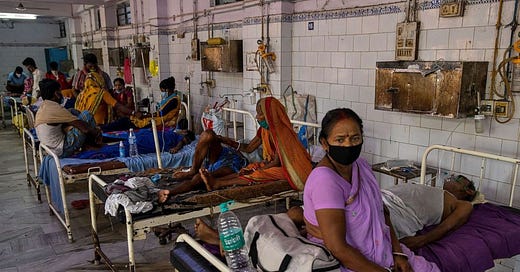Greetings fair readers. It’s been a strange fortnight, not least given the circumstances detailed below. I didn’t watch any Star Trek, which, to be honest, is a relief. Not that I mind watching it: it’s popcorn for the brain. But I’m relieved that I don’t have to rack my gray matter searching for another way to say that it’s cheap and pathetic. I’ve gone ten episodes and found pretty definitively that it lives up neither to the hype nor to my adolescent memories of the hype. I know a hint when I’m bludgeoned with one, so I’m shelving that project indefinitely. I may just rip through the rest of the series and write something about the whole steaming pile. We’ll see.
In the mean time, I hope you’re all staying healthy. You don’t want want what follows.
Hell is a hospital room. No doubt. I reckon being fried like an onion ring in a lake of fire for eternity is a drag, but it would at least have the virtue of being exciting. Houseflies weep at the prospect of doing time in a hospital.
This past Tuesday found me perambulating down an off-white corridor bathed in dour fluorescent light. At regular intervals fake-wood paneled doors are flanked by steel carts piled with chunky tan and gray plastic-cased technical equipment like Fisher-Price toys reimagined by Leonid Brezhnev. Every device seems to be emitting a distinct sequence of beeps and buzzes—distress signals comprehensible only to the multitude of blue-clothed nurses and doctors striding purposefully from door to door. Nobody acknowledges the alarms.
I was there to address a family medical emergency that erupted a little over a week ago. I won’t go into the details but suffice it to say a) it wasn’t me and b) I got to know the hospital much more intimately than I would ever choose. I have other hospital experiences: two children were forcibly extracted from their mother’s womb in hospitals. I’ve had a hernia repaired and an organ removed. And by the looks of things I have a weird magnetism for emergency rooms.
On the basis of this extensive research, I am prepared to make this statement: Hospitals are just terrible.
Ok I imagine some of you reading are probably nurses or nurse practitioners or radiographers or dietitians or anesthesiologists or—hear me out—phlebotomists. Probably some of you are even brain surgeons; I know my audience. I’d like y’all to step aside with me for a moment. I’m not talking about the services you provide. Modern medicine is practically magic and complaining about it is like farting in the Sistine Chapel. Even more amazing, medical professionals know how to work all these miracles. The brainwaves emanating from a good hospital is sufficient to warrant shielding against RF interference.
Unfortunately the model hospitals choose to deploy all that power is entirely Soviet. Somewhere in the bowels of every hospital there is a room full of bureaucrats making one-size-fits-all choices and soliciting the lowest bidders. Up in the rooms where they dump the patients, everyone is improvising.
On Thursday afternoon my charge—we’ll call her Mrs. X—hadn’t eaten since the previous evening. One of the endless stream of nurses to pass through the room had written an order on a whiteboard opposite the bed: “No food or drink after midnight,” on account of the procedure scheduled for that morning. They wheeled her out around five minutes after I arrived, placing her in a holding room like a cord of firewood, without so much as the side panel of a cereal box to occupy her mind. After two hours they called me to let me know they were ready to begin. Yeah.
An hour later they rolled her back into the room. It was one o’clock, and she’d been without food for thirteen hours. We waited for another hour and no cuisine was forthcoming, though more than once a passing nurse would remark, upon being pressed for news about food, that the whiteboard directive was not to be trifled with. Eventually I erased it myself, to no avail. At around two-thirty I ventured down to the cafeteria and purchased a veggie burger, which Mrs. X devoured like throwing a cabbage in a wood chipper. At three someone showed up with a tray full of lunch: a piece of chicken the size and consistency of a doorstop, a bowl of lukewarm rice, and a plastic container of fruit. The fruit, prepackaged in some dystopian factory in New Jersey, was the most appetizing thing on the tray.
An hour later someone showed up with another, similar tray. Was this dinner? At four o’clock? Well, it was the last food to make it to the room that day so I guess that’s a yes.
Half the food wound up on the bed anyway, where it remained until Mrs. X and I sped away from the place on Saturday afternoon. I don’t know whether they cleaned the bed or changed the linen after she left. To be honest the bed, a technological marvel right out of a Terry Gilliam movie, was such a passel of mechanical and electronic absurdities that a few kernels of corn and flecks of salmon were easily overlooked. The walled sides were covered with mysterious buttons, each of which served to reconfigure the bed into a different uncomfortable shape. At night—I’m told—the actuators to which the buttons were bound operated periodically of their own accord. There was a screen on one side which frequently displayed a notice that the bed was “experiencing an error,” which, let’s be frank, is a strange thing for a bed to experience.
Experiencing an error, however, was pretty much the governing metaphor for the whole week. The sheets are coarse and stiff, the blankets are thin. The toilet paper is like a cheese grater. Everything is broken in some way: the TV remotes are balky and the TVs work only when they please, the telephone attached to the bed with a long spiral cord—an artifact of a time not just before cellphones but before wireless of any description—contained several loose pieces of plastic that rattled when you picked it up. Some sort of expensive-looking but decidedly non-functional modular pump lay atop a cabinet where it had been left weeks or months before. Alarms go off with such regularity that the nursing staff doesn’t even seem to hear them, and they plead ignorance when you ask whether they can be shut off. All of the monitoring equipment attached to Mrs. X came with clamps that didn’t exactly fit any available mounts, though generally the staff just manhandled them into positions where they would stay put as long as they weren’t disturbed. As I sat at one point watching dust motes drift past the sunlight filtering through the blinds I noticed that several screws had started from the wall paneling and stuck out a half an inch or so. I tried to screw them back in but they were misthreaded and wouldn’t go.
Did we lose a war?
Ok, granted, we were struggling with serious medical issues and perhaps we were feeling somewhat raw, right? Well no, not really. I’m pretty good about keeping calm in a crisis (I have on at least two notable occasions in my life been too calm and was thus unable to convince others that there was in fact a crisis). And the plaintive alarms are real. The food really is terrible. The equipment is demonstrably broken. It’s a common refrain that America has “the best healthcare in the world,” but even if it’s true I suspect it’s a myopic assertion. We’re all smart enough to know that good health starts with rest and proper nutrition. Hospitals provide neither of those, and it’s really not any kind of secret. The day I arrived and saw Mrs. X for the first time I asked whether she was getting any rest. I was answered with a cynical chuckle from the nurse who was in the room at the time. “Hospitals,” she told us, “are not good places for resting.”
How indeed, then, can they ever be good places for healing?







Not an exaggeration, either.